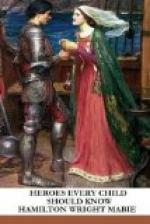Gil Diaz took great delight in tending the horse Bavieca, so that there were few days in which he did not lead him to water, and bring him back with his own hand. And from the day in which the dead body of the Cid was taken off his back, never man was suffered to bestride that horse, but he was alway led when they took him to water, and when they brought him back. And this good horse lived two years and a half after the death of his master the Cid, and then he died also, having lived full forty years. And Gil Diaz buried him before the gate of the monastery, in the public place, on the right hand; and he planted two elms upon the grave, the one at his head and the other at his feet, and these elms grew and became great trees, and are yet to be seen before the gate of the monastery.
CHAPTER XII
ROBIN HOOD
Because of the hardness towards the English people of William the Conqueror, and of William’s successors to several generations, many an Englishman exiled himself from town and passed his life in the greenwood. These men were called “outlaws.” First they went forth out of love for the ancient liberties of England. Then in their living in the forest, they put themselves without the law by their ways of gaining their livelihood. Of such men none were more renowned than Robin Hood and his company.
We do not know anything about Robin Hood, who he was, or where he lived, or what evil deed he had done. Any man might kill him and never pay penalty for it. But, outlaw or not, the poor people loved him and looked on him as their friend, and many a stout fellow came to join him, and led a merry life in the greenwood, with moss and fern for bed, and for meat the King’s deer, which it was death to slay. Tillers of the land, yeomen, and some say knights, went on their ways freely, for of them Robin took no toll; but lordly churchmen with money-bags well filled, or proud bishops with their richly dressed followers, trembled as they drew near to Sherwood Forest—who was to know whether behind every tree there did not lurk Robin Hood or one of his men?
One day Robin was walking alone in the wood, and reached a river spanned by a very narrow bridge, over which one man only could pass. In the midst stood a stranger, and Robin bade him go back and let him go over. “I am no man of yours,” was all the answer Robin got, and in anger he drew his bow and fitted an arrow to it, “Would you shoot a man who has no arms but a staff?” asked the stranger in scorn; and with shame Robin laid down his bow, and unbuckled an oaken stick at his side. “We will fight till one of us falls into the water,” he said; and fight they did, till the stranger planted a blow so well that Robin rolled over into the river. “You are a brave soul,” said he, when he had waded to land, and he blew a blast with his horn which brought fifty good fellows, clad in green, to the little bridge. “Have you fallen into the river that your clothes are wet?” asked one; and Robin made answer, “No, but this stranger, fighting on the bridge, got the better of me, and tumbled me into the stream.”




